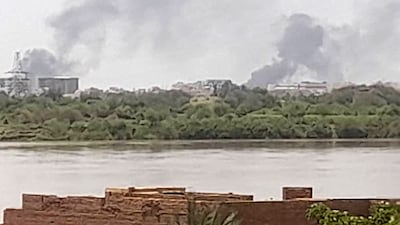Diplomatic efforts to find a peaceful end to Sudan's three-month-old war are experiencing a revival amid a flurry of top-level contacts but continuing fighting.
Sudanese army representatives have arrived in Saudi Arabia's Red Sea city of Jeddah this weekend to resume indirect talks, mediated by the US and the Saudis, with the paramilitary Rapid Support Forces, according to news agencies.
There has been no word from the army itself that it was returning to the negotiations after Reuters and AFP quoted unnamed sources on the matter.
Washington and Riyadh, moreover, have yet to announce the resumption of the Jeddah talks, which they suspended last month after ceasefires they mediated were not heeded or fully respected by the warring sides.
The RSF said on Sunday that the army representatives had never left Jeddah after the Saudis and the Americans suspended the negotiations.

“The army delegation is engaging in misinformation, because it is already in Jeddah and never withdrew from there for it to go back,” Youssef Ezzat, a senior aide to RSF commander Gen Mohamed Dagalo, said in a Facebook post on Sunday.
The RSF remains convinced that there is no way to end the war except through negotiations, he added, without saying whether the paramilitary group intended to send representatives back to Jeddah.
News of the return of the Sudanese army negotiators to Jeddah came just days after Sudan's seven neighbours launched a mediation effort to end the war. The plan, announced after the leaders of the seven nations met in Cairo on Thursday, was welcomed by the army, the RSF and Saudi Arabia.
A day later, US Secretary of State Antony Blinken and Saudi Arabia's foreign minister Prince Faisal bin Farhan affirmed a shared commitment to end the conflict in Sudan and meet humanitarian needs during a telephone call, according to the State Department.
Diplomatic efforts to end Sudan's war are motivated in large part by the huge humanitarian crisis it has created. More than three million people have been displaced by the war, which is centred in the nation's capital, the turbulent Darfur region and periodically in outlying areas like Kordofan and Blue Nile.

Of those displaced, more than 700,000 have crossed Sudan's borders to find refuge in neighbouring countries, chiefly Egypt, Chad, the Central African Republic and South Sudan.
The war, which broke out in mid-April, has also trapped millions in the capital who have to endure artillery shelling, air strikes and crossfire as well as lengthy power and water power cuts, scarce health services and skyrocketing food prices.
“There is co-ordination between Saudi Arabia and Egypt on diplomatic efforts to end the war,” said prominent Sudanese analyst Osman Al Mirghany. “Indirect negotiations will resume in Jeddah and then they will move to Cairo with representatives of both sides facing off across the negotiating table.
“The chances of success are decent, because the leverage of the neighbours on Sudan is significant. They are impacted by whatever happens in Sudan, whether positively or negatively.”
Sudan's neighbours also include Libya, Ethiopia and Eritrea.
Egypt's President Abdel Fattah El Sisi, the driving force behind the initiative of Sudan's neighbours, was in Kenya on Sunday to attend a regional meeting. Egyptian officials said he was expected to discuss Sudan with other African leaders in attendance.

The officials also said the foreign ministers of the seven nations were expected to meet in Chad within days to draft an executive plan to implement the Cairo proposals.
The diplomatic drive to end the war is under way amid continuing fighting and international moves to bring the RSF to account for its deadly attacks on ethnic Africans in Darfur and other alleged war crimes.
There were new clashes on Saturday in both Omdurman and Bahri, Khartoum's sister cities that make up the wider Sudanese capital, according to witnesses. At least four civilians were killed and four injured in a drone strike that hit a hospital in Omdurman, the Health Ministry said, accusing the RSF of carrying out the attack.
Also on Saturday, the RSF denied the findings of a report by Human Rights Watch that found that allied Arab militiamen and RSF fighters forces killed dozens of civilians in a single day in the West Darfur town of Misterei in May.
The raid was one of a wave of ethnically charged attacks that have spread in Darfur since the outbreak of fighting in Khartoum, leaving hundreds dead and displacing tens of thousands.
Witnesses and activists have reported RSF involvement in the violence in Darfur, where entire villages and neighbourhoods have been destroyed, with reports of mass civilian deaths and assassinations of officials for their ethnic background blamed on the RSF and the militiamen.

The RSF said the violence in Misterei and in the nearby city of Al Geneina was “purely tribal” and that it had no part in it. However, the International Criminal Court has launched a probe into suspected war crimes in Sudan since the war began, including sexual violence and civilians being targeted for their ethnicity, its chief prosecutor announced last week.
The RSF's forerunner is the Janjaweed militia, widely accused of war crimes when it fought on the government's side to suppress a revolt by ethnic Africans in Darfur in the 2000s.
Former dictator Omar Al Bashir, toppled in 2019 amid a popular uprising, was indicted by the ICC more than a decade ago for war crimes, genocide and crimes against humanity in Darfur.

